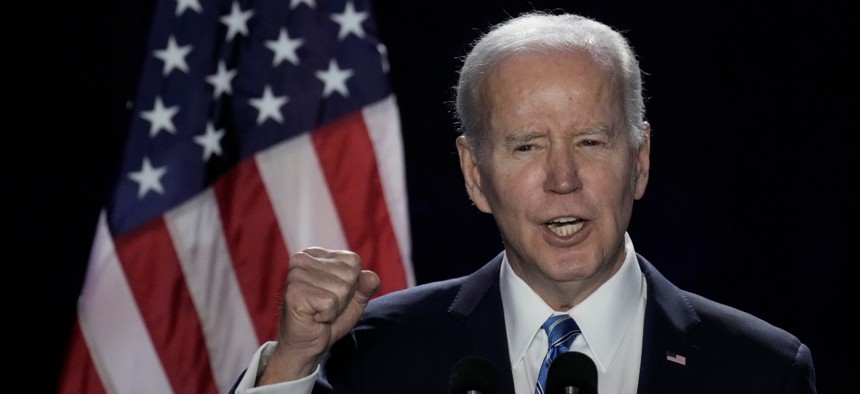
Administration officials are still working out the best way to advance the plan through Congress. Drew Angerer/Getty Images
President Biden Issues a Sweeping Anti-COVID Fraud Proposal
One piece would be to give law enforcement and oversight agencies more time and resources to go after fraudsters.
President Biden unveiled a sweeping legislative proposal on Thursday to crack down on COVID-19 fraud and help those affected by identity theft.
The plan has three parts: ensure that oversight and law enforcement agencies have the time and resources to go after fraudsters; invest in fraud and identity theft prevention; and help victims of identity theft. While there already have been hundreds of criminal convictions and millions of dollars have been recovered, watchdog officials have repeatedly stressed that their work is far from over.
“While the initial pandemic legislation in 2020—as well as the American Rescue Plan passed in 2021—were essential to mitigating the health and economic impact of this unprecedented pandemic, there must be a bipartisan response to punish those who engaged in major and systemic fraud against the American people during a time of national emergency, to put in place stronger fraud and identity theft prevention going forward, and to hold harmless those Americans who were innocent victims of identity theft,” a fact sheet from the White House stated. “President Biden is introducing a three-part historic pandemic anti-fraud proposal,” which totals $1.6 billion.
The president proposed tripling the number of COVID-19 Strike Force Teams. There are currently three of them, one of which “recently seized and recovered $286 million in stolen pandemic relief funds, and investigators have already identified several equally important cases,” according to the White House. Biden first said he wanted to do this during his State of the Union last month.
Other specific actions proposed included:
- Increasing the statute of limitations to 10 years for fraud cases in the pandemic unemployment insurance programs. Over the summer, Biden enacted legislation to extend the statute of limitations for Paycheck Protection Program and Economic Injury Disaster Loan fraud from five to 10 years;
- Providing at least $300 million to support investigative staff on the Pandemic Response Accountability Committee and select IG offices working on COVID fraud;
- Creating a permanent data analytics platform similar to the one the Pandemic Response Accountability Committee set up. Watchdogs asked for this during a hearing last month;
- Formalizing the “gold standard” meetings between agency and White House staff along with Pandemic Response Accountability Committee for early fraud prevention;
- Investing in “under-resourced” inspectors general, such as those at the Energy and Agriculture departments and the Environmental Protection Agency; and,
- Providing at least $300 million to prevent identity theft in public benefits programs.
The White House has also been planning for a while an executive order on identity protection.
In addition to the Pandemic Response Accountability Committee, the CARES Act, signed in March 2020, also established the Special Inspector General for Pandemic Recovery and Congressional Oversight Commission, which are not mentioned specifically in the proposal.
Gene Sperling, White House American Rescue Plan coordinator and senior advisor to the president, told reporters on a briefing call that the White House consulted with the top members of the oversight community to come up with this proposal.
The $1.6 billion proposal, which the White House hopes will gain bipartisan support on Capitol Hill, is a separate, mandatory spending proposal that is not part of the appropriations process. However, there will be additional, related funding requests in the president’s budget proposal to be released on March 9, Sperling said. Sperling also said that he will be on the Capitol Hill on Thursday talking with members of Congress about the best way to move forward on the proposal, such as whether it should be one massive piece of legislation or multiple measures.
When asked if the president has full confidence in all of his IGs to do their jobs and whether he is considering any nominees for those IG positions that don't have confirmed leadership, such as at the Treasury Department, Sperling said: “We’ve emulated a model that the president established during the Recovery Act of respecting the independence of the IGs while recognizing that working together on the front-end and preventing fraud can save the American taxpayer tens of billions of dollars.”
He added: “We have very purposefully continued that model with the [Pandemic Response Accountability Committee] and have gotten a positive response from the oversight community on this form of productive, respectful collaboration. Our proposal would support further productive collaboration in safeguarding the integrity of public benefits.”
The anti-fraud proposal comes after Biden said during his State of the Union address: “As we emerge from this crisis stronger, [we have] also got to double down [on] prosecuting criminals who stole relief money meant to keep workers and small businesses afloat.” He repeated his line from last year that “the watchdogs are back.”







